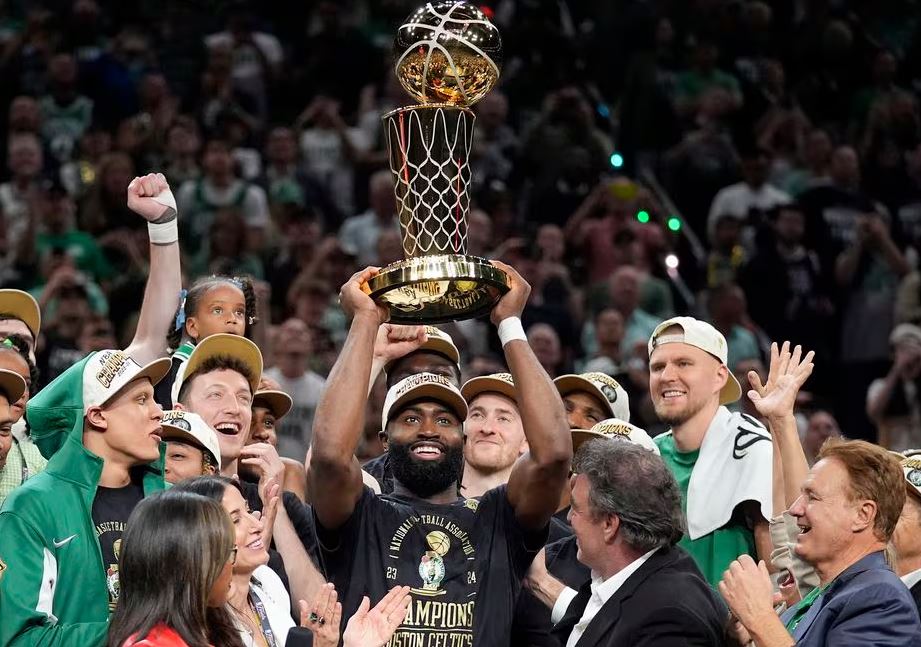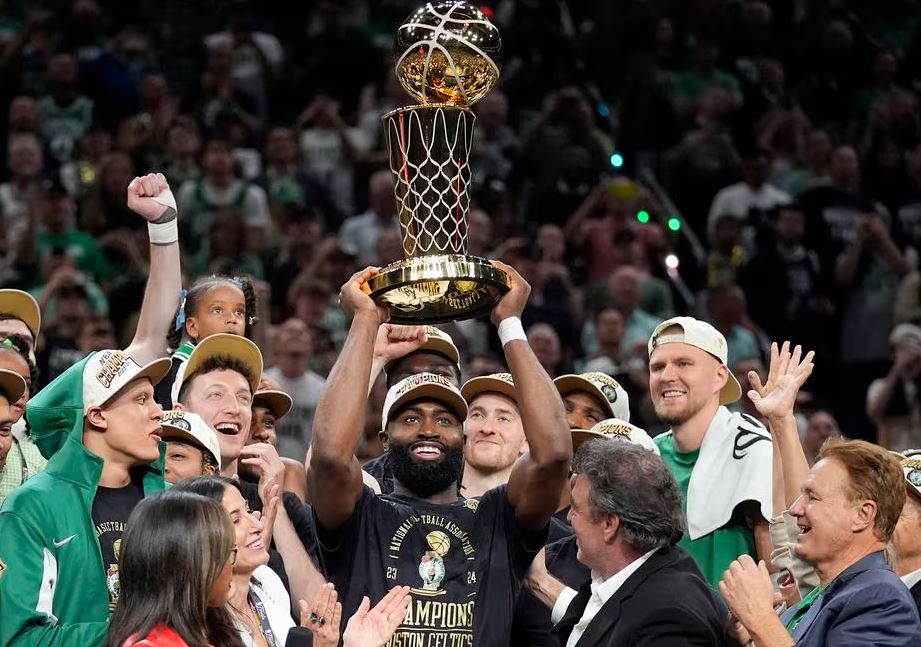
It took 1,312 regular season and playoff games, but the NBA has a new-again champion. The Boston Celtics claimed a record 18th title as an organization, even though it was the first for most of Boston's relatively young core, like Jayson Tatum and Finals MVP Jaylen Brown.
The menschy thing to do was to give the green machine a couple of days to bask in the glow of victory before saying, "What about the team *we* follow?" but now let's get selfish. As we've done after some prior years, it can be fun to look for clues or insights that might be useful or relevant to a Jazz team still trying to hang its first banner.
And this year's Finals — the playoffs in general, even — have one super obvious lesson for the Jazz on the surface:
Young stars grab the torch
The last three teams standing were teams with MVP candidates in their 20s, so even before we knew who would win, we knew that young starpower was going to decide this champsionship.
Tatum is 26 and just finished sixth in MVP voting. To make it to the dais, he had to beat Luka Doncic, 24 years old and a top-3 MVP finisher.
Zeroing in further on the Jazz's conference, Luka punched his ticket to the Finals by defeating Anthony Edwards, 7th in MVP voting at 22, and each of them had to make it past another young superstar: reigning MVP Nikola Jokic (29) and runner-up Shai Gilgeous-Alexander (25). All while older megastars like LeBron James, Steph Curry and Kevin Durant watched.
Those young stars are not going anywhere. The path to near-term competitiveness, it would seem, is to have your own version of what Boston and the West's best had: a top-10 player who hasn't turned 30 yet.
The encouraging news for Utah is that the very superstars we're talking about prove that there are multiple avenues to get there. Jokic was a second-round find. SGA was acquired in a rebuilding trade after a promising (but not flawless) 10.8-ppg rookie season. If you look at how the last decade's worth of title teams acquired their best player, there are examples of different pathways. Curry and Tatum/Brown were top-10 picks, Giannis Antetokounmpo was a mid first rounder, Jokic grew to stardom after being a second-round pick, and the other teams traded for a readymade superstar (Kawhi Leonard) or signed one in free agency (KD, LeBron for both Cleveland and L.A.).
So there's no one recipe to getting top talent. But it does seem increasingly clear that a prerequisite to coming out of the West is finding an answer to the Jokic/SGA/Luka/Ant tier of young MVP candidates.
Star-by-committee
At the same time, Boston is the first team in two decades to win it all with a best player who wasn't either a current top-5 MVP vote getter *AND/OR* a previous actual MVP.
You have to go back to the 2006 Heat, whose defining superstar was #6 in MVP voting that year, but they also had past MVP Shaquille O'Neale as a sidekick. If you don't count them, it's the oft-cited 2004 Pistons who won without a true super-duperstar. (The 2014 Spurs also borderline fit since Tim Duncan was an emeritus MVP candidate at that point and Leonard, who won Finals MVP, hadn't even been an All-Star yet.)
That's a long way of saying that if you squint, Boston could also be used as an example of making it to the mountaintop without a true top-5 player. Tatum is something close to that, although he didn't even lead the team, according to Finals MVP voters. But they probably had 4-5 guys who were top 50ish, which is a different way of addressing the need for starpower.
Danny's team?
The other fun discussion point for Jazz fans is the exact degree of credit current Jazz exec Danny Ainge gets for assembling Boston's title team during his long tenure there. You could probably argue it either way from a literal standpoint, but it's hard to deny that his fingerprints are on that organization.
Ainge maneuvered to draft the Celtics' two best players, and was responsible for bringing in their top basketball executive, Brad Stevens. He was also leading the front office when head coach Joe Mazzulla first came into the organization.
On the other hand... the other four in Boston's formidable top 6 came from moves made after Ainge stepped down, albeit with assets he had lined up. Mazzulla was given the head job by Stevens after a controversy involving the previous bench boss, and most of the staff is new or at least in redefined roles.
So there are enough talking points to support either position on technicalities, but frankly it would be hard to argue that Danny didn't help put the Celtics on this path. He hit on crucial draft picks, made shrewd asset moves, put the right accountability structures in place, and hired smart people who were capable of stepping into expanded roles. That's not a guarantee that he (and Justin Zanik, who does most of the day-to-day basketball ops work) can necessarily repeat the feat. But seeing a team Ainge helped assemble reach the promised land can't be a bad sign, either.
Parity
If you are most entertained by the eras of NBA hegemons, the last decade has not been your cup of tea. If, on the other hand, you root for a small-market underdog, then it's probably encouraging to see multiple franchise take turns as kings of the mountain.
Ten different organizations have hung banners in the last 14 seasons, including a different champion in each of the last six years.
In retrospect it feels like the Celtics were inevitable: they were preseason favorites and led the regular season standings by a mile almost from the get-go. But we're in an interesting era where there aren't really dominant superteams who are a foregone conclusion to win. That should mean the door is more open to outsiders, even though the team that won this particular championship is, oh, the league's most decorated franchise.
Flexibility
To the degree that there's anything to be learned stylistically from the Celtics' title squad, it's that they're not hyper-committed to one single style of play. The trade for Kristaps Porzingis unlocked some flexibility that was a key ingredient in their success.
Conversely, consider the teams that couldn't toggle quickly enough when the basketball environment flipped on them. Minnesota was constructed in a certain sense to be a team capable of competing with Jokic's Nuggets. They were assembled at a time when an extended competitive run by Denver seemed inevitable, and sure enough they were able to topple the Nuggets with their size and interior defense. But then when they faced a very different team in the next round and the basketball challenges were different ones, they weren't as equipped to win on those terms.
Even Dallas found itself stymied by a different challenge. They reached the Finals by defeating an adversary with a more traditional defensive approach and by suffocating an offense with some non shooters. Then when they suddenly were up against a hot-shooting team with comfort level in different defensive schemes, it was like kryptonite. The contrast to how Doncic schooled the Wolves but then couldn't unstick the Mavs against Boston is jarring.
Most champions have the ability to win in more than one way.
Pain
We talked about how Boston's core was the product of smart drafting and some well-timed trades. But what deserves more mention is the fact that some of those trades were gutsy moves that could have rocked the team's identity.
In particular, trading the popular Marcus Smart last summer had to be painful for many around the team. Same goes for when they traded the tantalizing Robert Williams III (plus Malcolm Brogdon and two 1sts) for Jrue Holiday. Or when they effectively salary-dumped energy guy Grant Williams. It cost them two more 1sts to turn Josh Richardson into the fast-improving Derrick White. But each time, the Celtics swallowed the bitter pill in order to assembled a team with five (5!) past or current All-Stars, plus White who is a do-it-all stud and has made all-defensive teams twice.
Any team aspiring to the mountaintop is going to reach those kinds of painful crossroads. Teams have to find that sweet spot between believing in their guys and not getting too attached to where you miss out on opportunities.
The Jazz, of course, know this too. In order to take a lovable-but-flawed roster to the no. 1 seed in 2021, they had to let beloved Ricky Rubio walk, trade fan favorite Jae Crowder, move on from lottery project Dante Exum and more. There are guys who feel central to their identity today who likely won't be part of the next special Jazz team. Exactly four Celtics are left on the roster from just three years ago: Tatum, Brown, Luke Kornet and Payton Pritchard, and only one assistant coach is still in his position. In pursuit of greatness, you sorta have to be unemotional about assessing what's truly sacred and what's replaceable.


